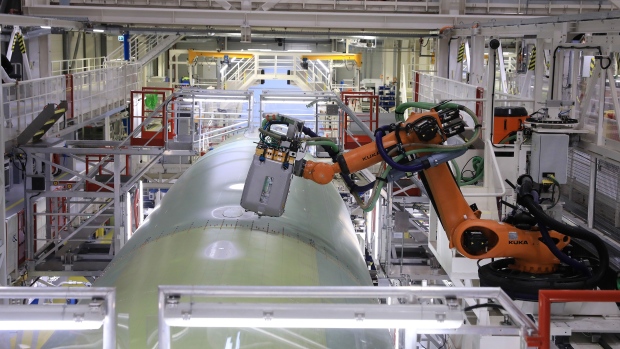Aug 6, 2021
Airbus A321 Delays Flare Again as Planemaker Begins Ramp Up
, Bloomberg News

(Bloomberg) -- Airbus SE has encountered issues with the production of its flagship narrow-body model, just as it begins ramping up jetliner build rates following coronavirus lockdowns.
Customer Air Lease Corp. said on an analyst call that some A321neo handovers due this year have been pushed back as Airbus struggles with pandemic and supply-chain issues. The lessor added in a filing that the A330neo wide-body has also been affected to a lesser extent.
“Airbus has advised us to continue to expect several months of delivery delays relating to such aircraft scheduled to deliver through 2022,” the Los Angeles-based firm said in the filing Thursday. “These delays also have impacted airline operations and the profitability of certain airlines.”
An Airbus spokesman said here’s no systemic delay, though “a few aircraft could be some months behind.” The company said any shortfall can be addressed by the end of the year.
Enduring snags with the A321neo could endanger Airbus’s plans to accelerate output coming out of the Covid-19 crisis. The high-capacity variant of the A320 is now its most popular aircraft, accounting for about half of the 6,000 or so narrow-bodies in the order backlog. The model had been plagued by glitches even before the outbreak, with engine issues slowing output and extensive cabin-customization options adding to build times.
While the A321neo’s only European production line is in Hamburg, Germany, the A330 is assembled at Airbus’s headquarters in Toulouse, France, so that the current issues appear to involve more than one site.
‘Aggressive Targets’
Sash Tusa, an analyst at Agency Partners in London, said it’s also concerning that the company is encountering problems with A320-series output at only 43 aircraft in July, when its recovery plans envisage boosting the build rate to 64 a month by the second quarter of 2023.
“If suppliers aren’t able to cope with the current levels of production it could delay the much more aggressive targets,” Tusa said. Problems with the A330 are surprising given that the average build rate has been cut below two planes a month as the pandemic continues to weigh on long-haul flights, he added.
The pre-Covid problems meant Airbus was was unable to keep pace with A321 demand and ultimately had to slash its 2019 delivery target.
Air Lease Impact
All told, Air Lease said it’s expecting to get 16 fewer planes this year than it had planned, seven of them being Boeing Co. 787 wide-bodies, a model afflicted by manufacturing flaws.
The rest concern aircraft including the A320 series. The lessor was due to receive 30 of the planes this year, based on Air Lease filings. It had taken 10 through July, including seven A321s, according to the latest Airbus figures.
The delays are “limiting near-term fleet growth expectations,” for Air Lease, analyst Helane Becker of Cowen said in a report. Air Lease Chief Executive Officer John Plueger said his firm will respond by holding onto its existing planes for longer.
In May, Airbus revived a plan to convert a French assembly line used for the defunct A380 superjumbo to build A320s and A321s. The switch, originally delayed by the virus, should be complete by the end of next year.
Airbus CEO Guillaume Faury said in June that the plan would help “de-bottleneck” narrow-body production in Hamburg.
(Updates with analyst comment in 12th paragraph.)
©2021 Bloomberg L.P.